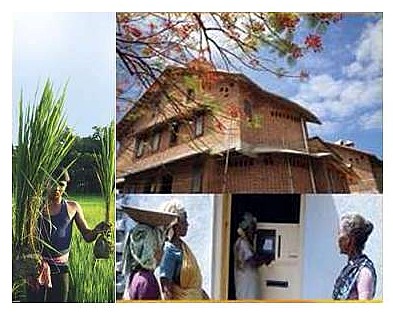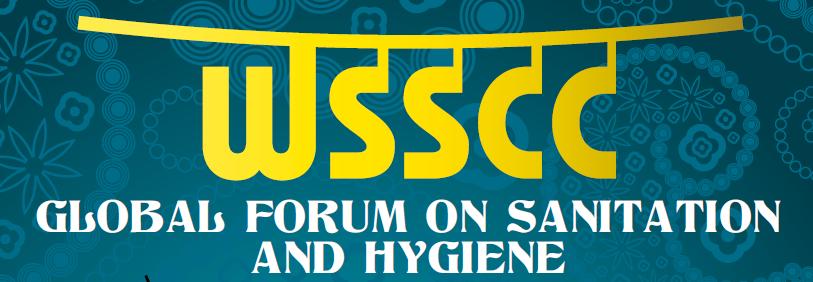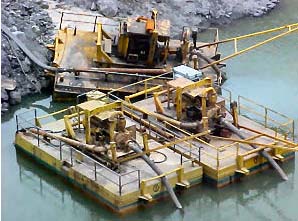Water Management
An overview of arsenic in groundwater in Tamil Nadu – A report by Water Resources Department
Posted on 26 Oct, 2011 06:03 PMNow-a-days heavy metal arsenic poses a health risk problem throughout the world. Arsenic may be found in water which has flowed through arsenic-rich rocks. Severe health effects have been observed in populations drinking arsenic-rich water over long periods in countries world-wide.
Evaluation of operation and maintenance of sewage treatment plants in India - Control of urban pollution series - CPCB (2007)
Posted on 26 Oct, 2011 03:39 PMThis study was commissioned recognizing the fact that discharge of untreated sewage occurs not only because of inadequate installed capacity of sewage plants, but also due to the inadequate maintenance of existing plants.
Piloting Knowledge Swaraj - A hand book on Indian science and technology - KICS
Posted on 24 Oct, 2011 04:23 PMThis hand book on Indian science and technology was produced at the end of a project entitled “Science, Ethics and Technological Responsibility in Developing and Emerging Countries” (SET DEV) by Knowledge in Civil Society (KICS). The project aimed at:
- Activating processes of building institutional capacities and skills on science,ethics and STR socialization
- Defining and understanding perspectives of socialization of science and technology that take into consideration local needs in a multilateral dialogue.

The need for a sound flood management policy and not another dam
Posted on 24 Oct, 2011 12:58 AMArticle Courtesy : Water Initiatives Odisha (WIO)
Author : Ranjan Panda
These large structural engineering solutions not only are obsolete but undermine the importance of ‘integrated flood management’. Time we grow up and design ways to live with floods again.
Live feed: WSSCC Global Forum on Sanitation & Hygiene - 9-14 October 2011, Mumbai
Posted on 13 Oct, 2011 10:22 AM
We all know the statistics: 2.6 billion people around the world are without access to a basic toilet. Diarrhoea – the vast majority of it due to poor sanitation and hygiene – is the second biggest killer of children worldwide.
Between us, we also have many of the answers. We have experiences of low-cost technologies that are acceptable and affordable for poor communities in rural areas. We have been involved in designing communications programmes that have contributed to sustained behaviour change.
We have seen governments and civil society working together to set up policies and programmes that ensure access to better sanitation in challenging settings, such as crowded informal settlements in fast-growing megacities. We have also seen businesses grow up around sanitation and hygiene, allowing individuals to make a dignified living and clients to buy the sorts of products and services they want and need.
Orissa, Bihar and Sikkim assess the damage done by floods and the earthquake - News Roundup (01 to 15 October 2011)
Posted on 12 Oct, 2011 02:13 AMThe work of repair and rehabilitation begins now. Assessments are being done of the assistance –and funds- needed in these two states.
Sikkim is beginning to assess the full extent of the damage caused by the 18th September earthquake. In addition to the loss of life, livelihoods have been severely impacted. The earthquake is also raising questions about the safety of the many dams planned on the Teesta.
Social exclusion and policy recommendations for the 12th Plan - WASH News and policy update
Posted on 11 Oct, 2011 09:52 PMContent courtesy: India WASH Forum
Thirupporur and Vadakkuppattu: Eighteenth century locality accounts – A report by Centre for Policy Studies
Posted on 10 Oct, 2011 08:26 PMThis research monograph on Thirupporur and Vadakkuppatu: Eighteenth Century Locality Accounts, prepared jointly by the Centre for Policy Studies, Chennai and Tamil University, Thanjavur, presents a graphic picture of the society and polity of eighteenth century Tamil Nadu.
Women and water - A collection of papers - Economic and Political Weekly - Volume XLVI - Number 18 - April 30 (2011)
Posted on 07 Oct, 2011 07:31 PMIt does this in the context of the new decentralised governance structures that are based on the assumption that domestic water supply is the legitimate domain of women and thus power and authority needs to be granted to women to manage water resources.
However, there is a very little understanding of how this has benefited women and what are the challenges experienced during the process of implementation or the outcomes gained from these processes, in the context of the Indian society that continues to propogate patriarchal values and is based on structures that are inherently hierarchical and inequitable.
Some of the papers dwell on and explore the inherent biases in the literature and make an attempt to understand their implications for women in managing water resources, while some of the papers share case studies on the outcomes of the implementation of the decentralised water management policies at the village level.
Draft Jharkhand Industrial Policy (2011) - What does it say on water ?
Posted on 06 Oct, 2011 09:50 PM
Image courtesy: Jharkhand State Industrial Development Corporation
The Jharkhand industrial policy (draft) 2011 has been formulated with the basic objective of optimally utilizing the available resources in planned and systematic manner for the industrialization of the state. It is aimed at enhancing value addition of the natural and human resources in an efficient manner to generate additional employment and resources for growth and development of the state.







